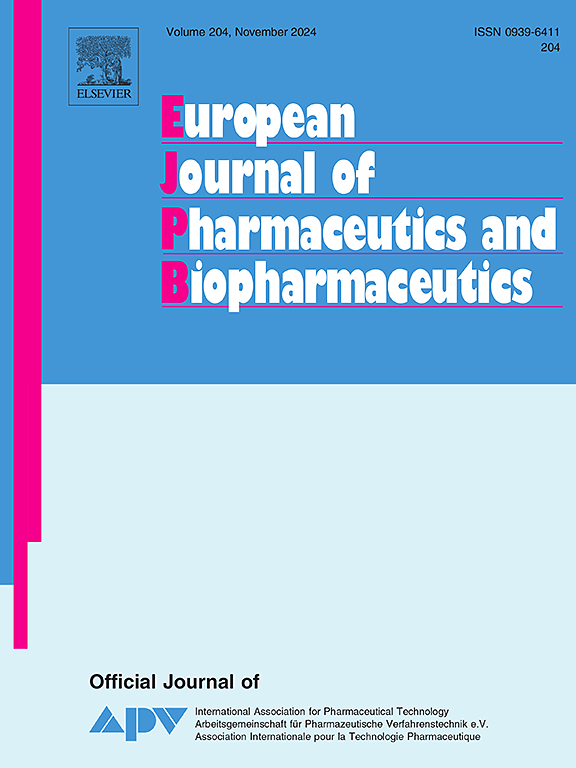Nebulized MSC exosomes promote the transdifferentiation of transitional state cells against acute lung injury through STAT3/Krt8/AQP5 axis
IF 4.3
2区 医学
Q1 PHARMACOLOGY & PHARMACY
European Journal of Pharmaceutics and Biopharmaceutics
Pub Date : 2025-06-17
DOI:10.1016/j.ejpb.2025.114792
引用次数: 0
Abstract
The transdifferentiation of alveolar epithelial type II cells (AECIIs) to alveolar epithelial type I cells (AECIs) plays an important role in the epithelial repair in acute lung injury (ALI). Although transitional state cells have been reported to regenerate the alveolar epithelium surface and promote a repair process, the treatment of ALI based on transitional state cells has not been suggested.
Here, we demonstrate that nebulized mesenchymal stem cell exosomes (MSC exosomes) can be used for ALI and MSC exosomes have the ability to promote the differentiation of transitional state cells into AECIs by regulating the STAT3/Krt8/AQP5 axis. In the in vivo study, immunohistochemistry and immunofluorescence staining results showed that MSC exosomes could reduce the expression of transitional state cells and promote transdifferentiation of AECIIs. In the in vitro study, western blotting (WB) results showed that MSC exosomes downregulated signal transducer and activator of transcription 3 (STAT3) phosphorylation and the expression of transitional state cell specific keratin 8 (Krt8), and upregulated the expression of AECIs specific aquaporin 5 (AQP5). The results indicate that MSC exosomes inhibit STAT3 phosphorylation through STAT3/Krt8/AQP5 axis, promote the transdifferentiation of transitional state cells to AECIs and accelerate the regeneration of alveolar epithelium after LPS-induced lung injury. Regulating transitional state cells to alleviate ALI is suggested for the first time.

雾化的MSC外泌体通过STAT3/Krt8/AQP5轴促进过渡状态细胞对急性肺损伤的转分化
肺泡上皮II型细胞(AECIIs)向肺泡上皮I型细胞(AECIs)的转分化在急性肺损伤(ALI)的上皮修复中起重要作用。虽然有报道称移行状态细胞能使肺泡上皮表面再生并促进修复过程,但尚未有人建议基于移行状态细胞治疗ALI。本研究表明,雾化间充质干细胞外泌体(MSC exosome)可用于ALI, MSC外泌体通过调节STAT3/Krt8/AQP5轴促进过渡状态细胞向AECIs的分化。在体内研究中,免疫组织化学和免疫荧光染色结果显示MSC外泌体可以降低过渡状态细胞的表达,促进AECIIs的转分化。体外实验中,western blotting (WB)结果显示MSC外泌体下调STAT3磷酸化和过渡状态细胞特异性角蛋白8 (Krt8)的表达,上调AECIs特异性水通道蛋白5 (AQP5)的表达。结果表明,MSC外泌体通过STAT3/Krt8/AQP5轴抑制STAT3磷酸化,促进过渡状态细胞向AECIs的转分化,加速lps诱导肺损伤后肺泡上皮的再生。首次提出通过调节过渡状态细胞来缓解ALI。
本文章由计算机程序翻译,如有差异,请以英文原文为准。
求助全文
约1分钟内获得全文
求助全文
来源期刊
CiteScore
8.80
自引率
4.10%
发文量
211
审稿时长
36 days
期刊介绍:
The European Journal of Pharmaceutics and Biopharmaceutics provides a medium for the publication of novel, innovative and hypothesis-driven research from the areas of Pharmaceutics and Biopharmaceutics.
Topics covered include for example:
Design and development of drug delivery systems for pharmaceuticals and biopharmaceuticals (small molecules, proteins, nucleic acids)
Aspects of manufacturing process design
Biomedical aspects of drug product design
Strategies and formulations for controlled drug transport across biological barriers
Physicochemical aspects of drug product development
Novel excipients for drug product design
Drug delivery and controlled release systems for systemic and local applications
Nanomaterials for therapeutic and diagnostic purposes
Advanced therapy medicinal products
Medical devices supporting a distinct pharmacological effect.

 求助内容:
求助内容: 应助结果提醒方式:
应助结果提醒方式:


